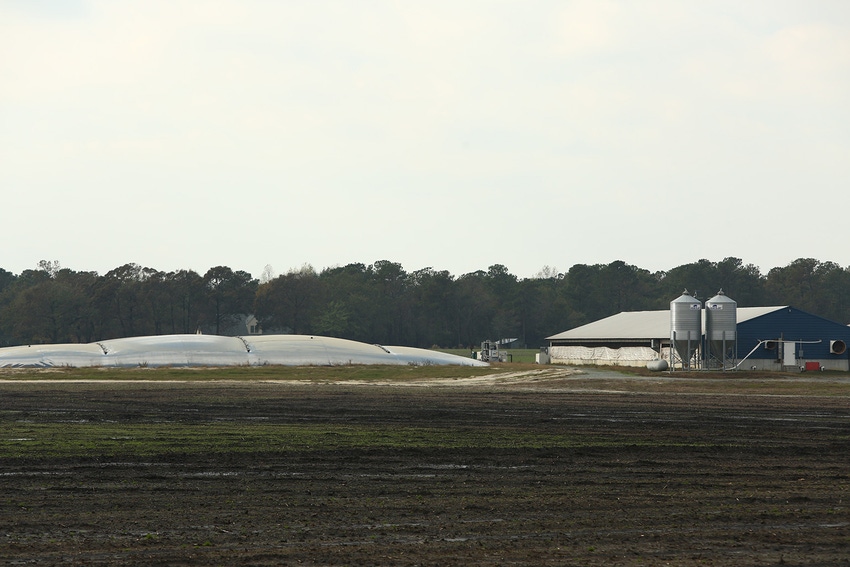Smithfield, Dominion Energy RNG project offers new revenue for farmers
Once collected at the farms, the natural gas will then be transported to a central conditioning facility where it will be converted into RNG.
November 27, 2018

Source: Smithfield Foods, Inc.
Smithfield Foods is joining Dominion Energy in an historic initiative to transform the future of sustainable energy and agriculture by capturing methane emissions from hog farms and converting it into clean renewable energy for residential home heating and power for local businesses. The first projects in the joint venture, Align Renewable Gas, will take place in North Carolina, Virginia and Utah.
“At Smithfield, we recognize true, enduring sustainability initiatives require collaboration with other proven innovators who share a similar vision,” says Kenneth M. Sullivan, president and chief executive officer of Smithfield Foods. “Dominion Energy is one such proven innovator and we are proud to partner with them in our longstanding pursuit of renewable energy. Align RNG is part of our nationwide expansion of Smithfield Renewables, innovative projects designed to help meet our goal to reduce our greenhouse gas emissions 25% by 2025.”
By capturing methane that would otherwise be released into the atmosphere, the use of RNG leads to a significant reduction in methane emissions from the agriculture and energy industries.
The new joint venture will leverage Smithfield’s relationships with contract farmers, who raise and care for its hogs, and the decades the company has spent studying and perfecting the commercial viability of ‘manure-to-energy’ projects. Using a technology known as anaerobic digestion, the projects will capture and process methane from large clusters of Smithfield’s company-owned and contract hog farms. Once collected at the farms, the natural gas will then be transported to a central conditioning facility where it will be converted into RNG.
“Our companies recognize the urgent need to reduce greenhouse gas emissions for the future of our planet. RNG is an innovative and proven way to dramatically reduce greenhouse gas emissions from the agriculture industry by converting it into clean renewable energy,” says Thomas F. Farrell, II, chairman, president and chief executive officer of Dominion Energy. “RNG is considered carbon-negative because it captures significantly more greenhouse gas emissions than are released from its end use in homes and businesses.”
Supporting Virginia and North Carolina’s greenhouse gas initiatives
Governor Ralph Northam and Governor Roy Cooper have recently announced historic initiatives to significantly lower greenhouse gas emissions in Virginia and North Carolina over the next decade. RNG will play an important role in supporting these initiatives and help both states achieve their ambitious greenhouse gas reduction targets. Because methane is at least 25 times more potent than CO2 as a greenhouse gas, reducing methane can have a more dramatic impact on the environment than other carbon reduction initiatives.
“Across our electric and natural gas fleets, Dominion Energy is becoming a national leader in sustainable energy,” says Farrell. “On the electric side, we are one of only three utilities in the nation to reduce its carbon intensity by more than 40% in the last decade. On the natural gas side, as an industry leader on methane reduction programs, we have already saved more than 10 billion cubic feet of methane emissions. We have made tremendous progress, but we recognize we need to do more. RNG will build on the progress we’ve made and accelerate our momentum toward a sustainable energy future.”
As global leaders in the energy and agriculture industries, Dominion Energy and Smithfield have the resources, expertise and market access to expand this proven technology on a wide scale across the region. The companies are jointly investing at least $250 million in this initiative over the next decade with initial application on 90% of Smithfield’s finishing spaces in North Carolina and Utah. In addition to these states, projects will be implemented in Virginia and have the potential for wider-scale application across the country.
“With a longstanding commitment to sustainability, and through considerable research and exploration of ways to transform manure into energy for many years, we are well-positioned to make unprecedented and revolutionary progress that will positively impact the future of the agriculture and energy industries,” says Sullivan.
Building on the success of Smithfield’s Optima KV pilot project, the new joint venture will immediately expand the program to two larger farm clusters in Duplin and Sampson Counties, North Carolina; Waverly, Virginia; and Milford, Utah. Construction of these facilities is expected to begin in late 2018 with the first projects scheduled to be in-service in late 2019.
RNG: Reliable energy, new revenue stream
RNG provides energy 24/7, 365 days a year and can be used on-demand to meet the real-time needs of homes, businesses, utilities and manufacturers.
“With this transformational partnership, we are combining the environmental benefits of renewables with the reliability of natural gas to meet the around-the-clock clean energy needs of consumers and businesses,” says Farrell.
RNG also will provide a new revenue stream for family farmers. In fact, the initiative will turn one of farmers’ largest costs into a new revenue source. Farmers who participate in the program will be paid for the energy their farms produce through long-term contracts.
“This project is a true win-win for all involved and reflects Smithfield’s innovative, value-driven approach to sustainability,” says Sullivan.
RNG facilities will also help protect hog farm lagoons from storm-related damage. In addition to converting ‘manure-to-energy,’ the covered lagoon digesters mitigate potential issues associated with severe rain events such as hurricanes. Covered lagoon digesters prevent rain from entering the lagoon during severe weather events providing enhanced environmental protection.
You May Also Like



